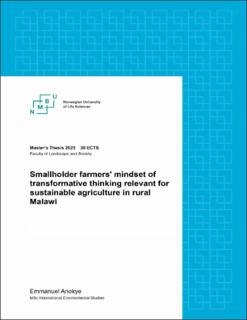Smallholder farmers' mindset of transformative thinking relevant for sustainable agriculture in rural Malawi
Master thesis

Permanent lenke
https://hdl.handle.net/11250/3079314Utgivelsesdato
2023Metadata
Vis full innførselSamlinger
- Master’s theses (LandSam) [1033]
Sammendrag
ABSTRACT
Land restoration, low agricultural productivity of key crops, and food insecurity remain significant concerns in Sub Sahara Africa (SSA). A growing population, depleting resources, and a changing climate exacerbate these issues. Many agricultural innovations (AIs) exist around the world as means of increasing agricultural productivity, sustainability, and food security, but they have had limited success in these countries of which Malawi is part. The possible barriers could also be an unexamined mindset of all actors. To improve inner transformation thereby advancing sustainable agriculture, Farmer Field School (FFS) has shown to be a key strategy for knowledge impact. The findings revealed that FFS improved farming practices and had less of an effect on agroecology, also study participants (both FFS and non-FFS members) demonstrated partial adoption of technological change. An existing FFS area was chosen to examine the barriers that prevent smallholder farmers from acquiring knowledge, and the findings suggested that cost and technical know-how were significant barriers. Agricultural knowledge can be easily transferred through Farmer Field School (FFS) and lead Farmer approach as Malawi's current extension services (extension-farmer ratio) are shortcomings as shown by this study. This study used a participation technique that included two focus group discussions and a semi-structured interview with a total of 80 smallholder farmers in rural Malawi.